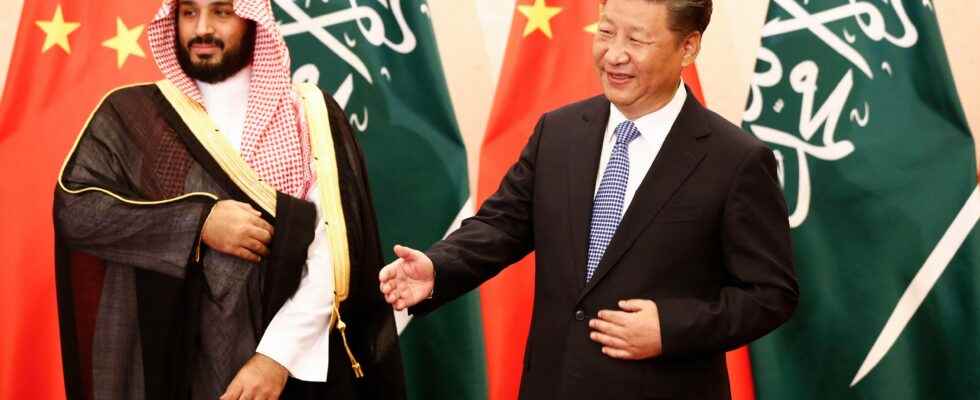No more diplomatic isolation for Mohammed Ben Salman and Xi Jinping. The Saudi crown prince has just spent three and a half years in international quarantine against his will: he had become radioactive for other heads of state since the assassination of journalist Jamal Khashoggi in October 2018. The Chinese president, for his part, has not for a long time not crossed the borders of a country locked up for almost three years in its “zero Covid” strategy, before resuming international travel from mid-September. At the end of 2022, the two all-powerful leaders are meeting for a summit meeting in Riyadh from this Wednesday, December 7, with a strong message sent to the rest of the world.
The red carpet for Xi, after the icy welcome for Biden
The rumor of a meeting between the two men has been floating in the air since this summer and Joe Biden’s failed trip to Saudi Arabia. On Tuesday, the Saudi kingdom confirmed Xi Jinping’s arrival in Riyadh the next day for a regional summit with Arab leaders, his first visit abroad since being reappointed for a third term in October. “This visit by President Xi to Saudi Arabia illustrates the strategic choices that the Chinese and Saudi governments both want to put forward, says Kristian Coates Ulrichsen, Gulf specialist at the Baker Institute in the United States. Xi can demonstrate that he remains a central figure on the international stage while the Saudis, like other Arab countries, can tell the Biden administration that they are not on his side.”
The red carpet rolled out by MBS to Xi will inevitably be compared to the icy visit of the American president last July. Biden, who had promised to treat the Saudi prince as a “pariah” at the start of his term, had resolved to make this trip in order to lower oil prices and pump prices in the United States. MBS’s outright refusal sounded like a humiliation for Washington, and like the signal of a new Saudi independence on the international scene.
China intends to get into the breach and win the loyalty of its main supplier of hydrocarbons. Saudi Arabia now supplies 25% of the oil consumed by Beijing. Riyadh also seeks to perpetuate this relationship, while Russia is selling off its natural resources because of European embargoes. “The Saudis want to secure their place on the Chinese energy market, explains Kristian Coates Ulrichsen. In Riyadh, the leaders are convinced that the geo-economic center of gravity of the 21st century is located in Asia and they want to be part of it at all costs. So far, they have managed to strike a balance in their relationship between China and the United States, with no one asking them to make a clear choice.”
However, the Saudi balance between Beijing and Washington seems to be tipping at full speed: bilateral trade between Saudi Arabia and the United States has collapsed from $76 billion in 2012 to $29 billion last year. At the same time, trade relations between Beijing and Riyadh today reach 65 billion dollars.
The Uighurs and Iran, subjects of conflict between Beijing and Riyadh
But all is not rosy in the Sino-Saudi sky. Protector of the holy places of Islam, the Saudi kingdom is obliged to remain silent on the treatment inflicted by Beijing on the Uighur Muslim minority, locked up in camps and “re-educated” by the authorities in the province of Xinjiang. Even if it means damaging its image in the Muslim world.
Another reason for litigation: the particularly developed relationship between China and Iran, a great geopolitical enemy of the Saudis. So many signs that show that the special relationship between Xi and MBS does not yet go beyond the stage of the economy. “Saudi Arabia accepts that China maintains a working relationship with Iran, believes Kristian Coates Ulrichsen. Such an arrangement is not seen as a threat to the China-Saudi Arabia relationship, which is considered more economic than geopolitical. “
Energy and arms purchase contracts should therefore be signed during Xi Jinping’s visit, but little else. “No significant gesture is to be expected from this visit, judge Abdulaziz Al Sager, director of the Gulf Research Center, in a note for the Montaigne Institute. The Gulf’s relationship with China is one between a buyer and a seller, with the Gulf selling its oil and buying Chinese-made goods. But on strategic issues, the Gulf countries rely solely on the security guarantees offered by the West. All projects with China are slowing down and Riyadh understands that, in Beijing’s eyes, Iran is more important than all the Gulf countries.” The radiant images of the Chinese visit to the Gulf may, despite everything, create a few cold sweats in Washington.
